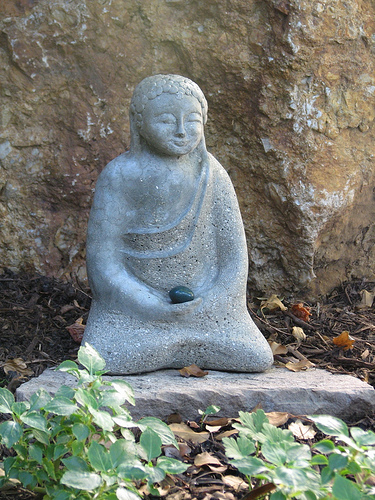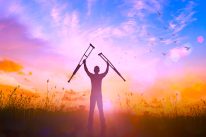“Information is not knowledge.” -Einstein
It’s an interesting time to be a publisher. Before magazines had online counterparts, choosing articles to feature was a much more selective process, as there was no need to solicit more pieces than you could feasibly fit in an issue.
Now that page views are dollars, quality hasn’t necessarily become less important, but publishers are certainly more focused on providing more to readers—more links to click on, more posts to tweet, and more places to get involved in conversations.
Recently, I’ve received a few requests from larger sites asking if I’d like to participate in content share programs—meaning they’d republish Tiny Buddha posts to keep readers on their sites, and I could do the same with their content to keep readers here.
I realize that larger publishers have greater needs, since they have a product to sell and employees to pay. But still, I can’t help but feel that providing content readers could find elsewhere solely to increase page views—particularly when it’s related to personal development or happiness—somehow misses the point.
I’d even go so far as to say it’s contrary to the intention, since we’re generally happiest when we read what we need and then focus on applying what we’ve learned (as opposed to continually searching for more answers outside ourselves).
Still, I think the new era of information overload provides benefits as well as challenges. For one, it gives us countless opportunities to practice choosing what information we simply don’t need.
Conventional wisdom says that knowledge is power, which implies that the more we learn, the better equipped we are to make positive changes in our lives and the world. But sometimes not needing new information is power.
There is power in knowing when to stop reading and start doing. There is power in learning to recognize when you actually need guidance, and when you’re seeking answers solely to avoid doing what you know in your heart is right. There is power in learning what to tune out and what to allow in.
The web will continue to grow, and more and more sites will compete for our attention. This means we have countless opportunities to practice using information instead of letting information use us, and limitless chances to expand our awareness instead of focusing on learning more.

Photo by Big Mind Zen Center
About Lori Deschene
Lori Deschene is the founder of Tiny Buddha. She started the site after struggling with depression, bulimia, c-PTSD, and toxic shame so she could recycle her former pain into something useful and inspire others to do the same. You can find her books, including Tiny Buddha’s Gratitude Journal and Tiny Buddha’s Worry Journal, here and learn more about her eCourse, Recreate Your Life Story, if you’re ready to transform your life and become the person you want to be.
- Web |
- More Posts













 Though I run this site, it is not mine. It's ours. It's not about me. It's about us. Your stories and your wisdom are just as meaningful as mine.
Though I run this site, it is not mine. It's ours. It's not about me. It's about us. Your stories and your wisdom are just as meaningful as mine.
I agree totally. I have become very selective in what I read. I have other things to do too. lol
Content is ice cream. Just enough for a taste, and preferably made at home. Too much and you lose appreciation for each spoonful.
Yes, I definitely agree! Sometimes less is more.
Yes, you make a good point here. But learning when to stop taking in more information/knowledge I imagine is very difficult to do for many people. I’d be very interested in reading a tips post on how to be guided on this!
Hi Andrea,
I suspect it really comes down to instinct and self-awareness. For example, there are times when I may mindlessly hop from article to article to avoid acknowledging what I’m feeling and what I should do about it.
If you look at the bottom of every Tiny Buddha post, you will a little blue icon of a Buddha holding a book. This is the “read what you need” icon. I put it there as a reminder to ask yourself, “Do I really need to read more, or would it better to step away from my computer and do something with what I just read?”
I think it’s really as simple as that: Checking in with yourself and asking if you actually need to consume more information in any given moment!
http://dev.tinybuddha.com/read-what-you-need/
Lori
Andrea, for me it just happened. It was a gradual, natural progression following upon a feeling of information overload. First, I began to notice when I was reading rehashed ideas I’d read before in various media. Soon I began to get bored with same-old same-old (maybe reworded, but same ideas). Then I began to feel overloaded. And then I just started ignoring rehash, first articles then whole websites.
The only conscious thing within that gradual process was that, at some point, I gave myself permission. I told myself it’s OK to not read everything and anything.
One more tip, something I’ve done to keep up my practice of filtering out the overload. I started using a feedreader. When I like a site, I subscribe. Rather than read everything right away, it all gets filed for later. When I finally open the reader, it’s Very Easy to skip some articles and read others. It’s like overfilling one’s plate with goodies at a buffet, and in the end only eating what really appeals because there isn’t room for all of it.
Excellent post. You are right that there is so much out there competing for our attention. One thing I do on twitter is to have different lists – “best”, “good”, and everyone else for people I follow. I monitor the “best” list every day – the very best twitter people I follow and get inspiration from (you are on that list 🙂 The “good” list is larger and those people have valuable insights too but I often just don’t have time to read their tweets every day. I do visit the “good” list from time to time and when I come across some really inspirational tweets I might promote them to the “best” list (or demote “best” twitters to “good” if I haven’t received as much value from them lately).
I like the Hootsuite twitter app for segmenting the people I follow into lists.
Thanks for the tips! I like that social media is moving toward segmentation. I’m not actually on Google+ yet, but I know that’s a big part of the appeal.
I agree with you Lori — I think it was a good idea not to share your content elsewhere. I come here at the exclusion of other things to stay focused and to gather nuggets, not noise.
I’m curious how you come up with the topics you do — are you responding to what readers say they want, or are you going more with what your instinct tells you.
Thanks for the post.
You’re most welcome! I come up with topics in a number of ways. Sometimes I respond to comments or emails I receive; but most often I write about things I deal with/things that occur to me throughout my day. If I focus on what I’m learning, I never run out of things to share.
I completely agree! Great post. If there’s too much out there and we’re overloaded with information, it’s much harder to digest, I think.
Thanks so much Sarah. I definitely think less is more.
Oh this completely resonates with me. I have just realised that I’ve spent the better part of many years reading – everything I could get my hands on…I have lists of certain things I wanted to achieve that are the same today as they were 10 years ago because I have not actioned anything!! I have found that now I’ll seek the information rather than read everything to find something that I may “need” to know…When I seek the information I feel is relevant to me I find I take leaps forward in my growth…it is a far more organic process and I’m able to reach my goals a lot easier as I’m ready for it…
I’m glad this came at a good time for you! I think you hit the nail on the head about seeking the information that’s relevant, as opposed to taking in a vast amount of information, which can ultimately be paralyzing!
Synchronicity bops me on the head: I was thinking about how I use my days (I’m self-employed and work at home – Artist & Life Coach. I worked a 9-5 (actually 8-5 and more) for 24 years so now I’m figuring out how to enjoy a flow of time and also feel I’m moving forward. I read your articles everyday and thought about how much time I spend on the internet reading. Thought I’d cut back, not necessarily read Tiny Buddha EVERY day. Then BAM! There’s your piece on Reading What We Need. Amazing. Soooo, I figure I’ll read what hits home. Back to where I started, reading every day because either one or the other piece intrigues me, hurts, makes me laugh or feels downright psychically connected! Thank-you for such rich food for thought, connection and beautiful photos!
Anne Gregson
The Grateful Gonzo
You’re most welcome Ann! I’m glad this post hit home for you. Since I also work from home, this is something that’s been relevant to me. Sometimes I’m tempted to hop all around the web consuming information to avoid acknowledging that I actually want to get outside, or connect with someone in person, or do anything other than sit by myself in front of my computer. It’s like I feel I am “supposed” to be at my computer, because this is where I write and engage with my readers–but ultimately I am better able to do that when I create a balance between being online and doing off the web!
Incidentally, if you do decide to cut back on reading Tiny Buddha, I offer a weekly subscribe option, so you can receive a digest from the week on Fridays. This only shows the titles, with links to the site, so you could decide what’s relevant to you and click on only those articles. Just letting you know it’s an option if you decide that’s best for you. =)
Over the past year I’ve discovered blogs on self improvement and been doing alot of reading. I found myself learning from multiple authors with different perspective and realize it’s just information until you put to practice. Great post!
Thanks Sarorn!